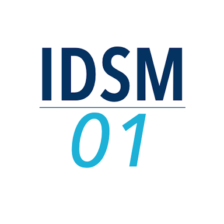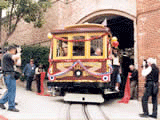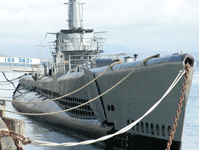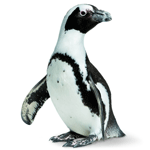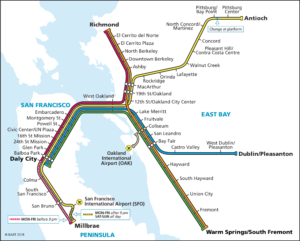
The things to see and do in San Francisco could fill a book (and in fact have filled many books as well as websites) so we limit ourselves here to a few great favorites and technophilic highlights.
The Bay Area Rapid Transit (BART) train is a light-rail trunk line serving much of the Bay Area. It is highly recommended as a quick and easy way to get to downtown San Francisco from Berkeley.
For something different that many visitors would find rewarding in its own right, you could take BART to Oakland’s 12th Street / Oakland City Center station, walk or walk or ride the “Free B” bus to the Jack London Waterfront, and there take a ferry to San Francisco. The usual San Francisco terminal is the Ferry Building (near the Exploratorium, among other destinations) but some routes serve Pier 41 (near the Pier 39/Fisherman’s Wharf area) or, when the San Francisco Giants have a home game, AT&T Park.
(Downtown Oakland, the Jack London Waterfront, and the Old Oakland neighborhood between them are rewarding destinations in their own right. For this you would get off at 12th Street—Oakland City Center BART.)
Put Some Hallidie In Your Holiday at the Cable Car Museum
Chances are that visitors to San Francisco want a cable car ride. If you took BART into the City, get off at the Embarcadero or the Powell Street BART stations. If you came by ferry, you can walk up Market Street to the Embarcadero cable-car station, or take the ferry to its Pier 41 dock and catch the Powell/Hyde or Powell/Mason lines.
The Powell Street cable cars stop at the Cable Car Museum at the highest point of the lines; there you can get an inside look at an apex technology of the Victorian area, still very much in use.
Destinations Along The Way: Union Square, Chinatown, North Beach…
The Powell/Hyde and Powell/Mason cable car lines begin near the Union Square shopping district, and the cable car museum mentioned previously is just uphill from Chinatown (get off at Jackson or Pacific Street and walk downhill). If you walk far enough downhill you get to Columbus Avenue. Then you can turn north (away from the tall buildings of the Financial District) to see the North Beach neighborhood, which still has an Italian flavor after all these decades of the “melting pot,” not to mention more than just echoes of the Beat Generation. Did Tosca Cafe serve America’s first espresso? Will Lawrence Ferlinghetti’s bookstore help you find inspiration? Are there really wild parrots on Telegraph Hill? Come find out in person!
Walking in San Francisco: Your Choice of Flat or Decidedly Not So
The Embarcadero links the Ferry Building and eponymous BART station to the Pier 39/Fisherman’s Wharf area; it is flat and often sunny and thus very popular among pedestrians. The cable cars, of course, are for parts of the city that are very hilly. You can easily see how to incorporate a walk into a triangular route that also includes a cable-car ride. (An ambitious walk could even include the Golden Gate Bridge.)
Get Up Close to Science at the Exploratorium
One of the many attractions along the Embarcadero is an easy walk from BART: the Exploratorium, a hands-on science museum and education center founded by Frank Oppenheimer in the 1960s. The Exploratorium hosts physical and performing arts (often with a scientific angle) as well as scientific exhibits. Gayle Laird photo of “Cubatron” courtesy Exploratorium
Sail Back in Time at Pier 39 and Fisherman’s Wharf
The Pier 39 and Fisherman’s Wharf areas are tourist favorites with much to offer the technically and historically inclined. Near Fisherman’s Wharf, you won’t want to miss the San Francisco Maritime National Park, with ships ranging from 1886 square-rigger BALCLUTHA to the WW2 fleet submarine USS PAMPANITO.
Berthed nearby is a Liberty Ship that is not only seaworthy but in an authentic original configuration: SS JEREMIAH O’BRIEN, a National Register of Historic Places living museum that just turned 75.
USS PAMPANITO photo courtesy SF National Maritime Park Association
Golden Gate Park and the California Academy of Sciences
In Golden Gate Park — one of America’s great urban open spaces and host to many attractions — a highlight is the California Academy of Sciences. Their much-praised new eco-conscious facility is an exhibit in itself. Iconic features like the Morrison Planetarium, Steinhart Aquarium, Osher Rainforest, and Kimball Natural History Museum are complemented by an ever changing variety of exhibits. See their daily calendar for details of what’s happening on the day you plan to visit.
It is a taxi ride from the other attractions we have mentioned; adept users of “the Muni” (San Francisco’s public transit system) may consider the #44 O’Shaughnessy or #5-Fulton buses or the N-Judah streetcar. Once you’re there, a free shuttle serves the major features and attractions of the thousand-acre park. Photo © California Academy of Sciences
And Since Our Brains Have a Right Hemisphere Too…
Just three years ago San Francisco’s Museum of Modern Art had a remodeling and expansion that, according to the New York Times, “bumps this widely respected institution into a new league, possibly one of its own.” They have 30,000 works (not counting the architecture and design in their own right) ready to experience. The location is convenient to the Bay Area Rapid Transit train.
Another guide to drawing on the west side of the Bay is SF Art Enthusiast.
Weather
San Francisco weather can be cooler and cloudier than that of the conference venue in Berkeley (and is quite variable by neighborhood). The Exploratorium has a page with current observations and historical conditions at their site along the Embarcadero.
